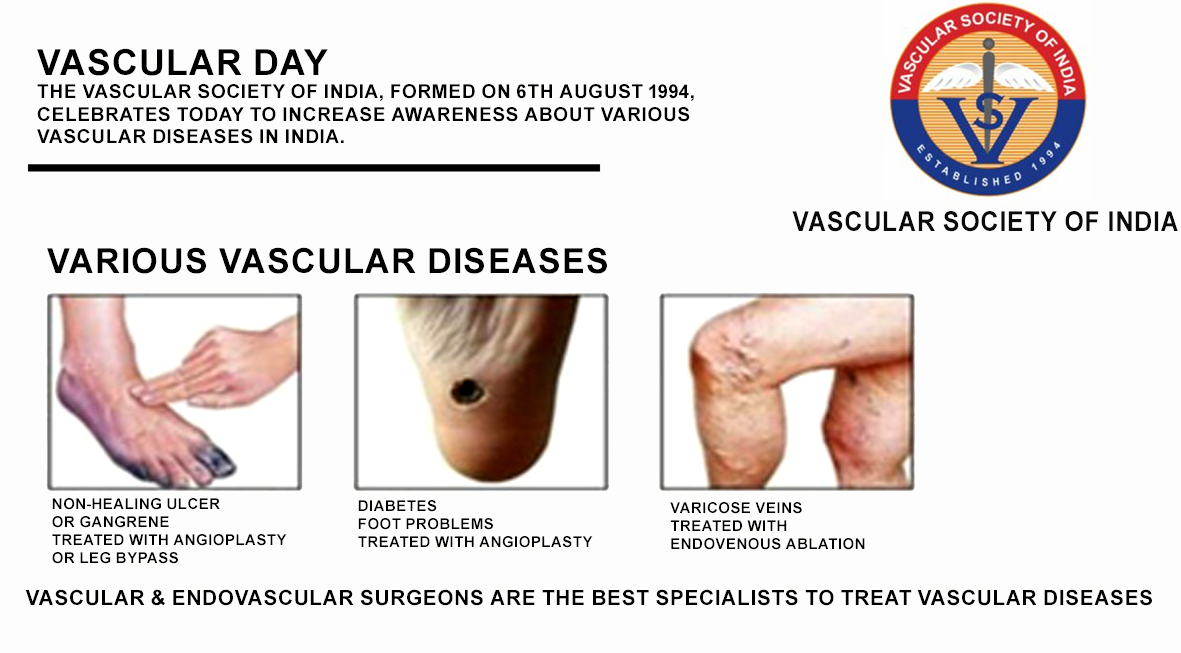Dr Arvind Kohli
Vascular Disease is an important cause of morbidity and affects 10 million people in India. Therefore it becomes very important for the health care providers to know the pathology, clinical presentations and treatment of common vascular disorders. Awareness and interest in Vascular disease is growing in India because of the potential risk to limbs, vital organs and life threatening conditions arising out of delayed treatment
Role of a Vascular surgeon
Vascular surgeons specialise in the clinical evaluation, diagnosis and treatment of diseases involving the network of arteries and veins that carry blood throughout the body They are called Vascular Specialists and manage the patients by advising the patients on diet ,exercise and life style modifications, medications and perform the surgery both open and endovascular
Prevalence of vascular diseases – Incidence of Vascular ailments are rapidly increasing in our country Advanced age, smoking habit, consumption of alcohol, over eating, obesity, physical inactivity coupled with diabetes and hypertension are found to enhance the disease process Atherosclerosis and allied causes like arteriopathies lead to involvement of aorta and arteries resulting in aneurysmal or occlusive diseases with potential risk to limb, organ and or life.. Varicose veins and Deep vein thrombosis with serious potential complications like Pulmonary embolism are also on the rise. Accidents with injury involving major vessel are rapidly increasing with socioeconomic changes in the community
Public awareness in India vascular diseases are under diagnosed and undertreated, and there is evidence that guideline recommendations are not being adequately followed in practice. The Vascular specialists should consider the creation of national vascular disease quality initiatives such as a Peripheral Arterial Diseases or Venous Thromboembolism registries , setup the Guidelines and introduce a System of Care for vascular disease.
Awareness Programs for control of these diseases at primary level and patient education about risk factors could significantly improve the identification and treatment of patients with vascular disease The awareness programs aims to advising people on a range of topics related to vascular disease and its incidence, screening and treatment and provide them with videos, articles, research guides etc and owing to these the increase the over all awareness about Vascular disease and Vascular Surgery amongst the Public
Interventions
Interventions in vascular surgery focus on improving quality of life. Key arterial procedures include carotid endarterectomy, abdominal aortic aneurysm repair, and lower limb arterial bypass. These procedures are performed for the management of cerebrovascular disease (reducing the risk of stroke), aneurysmal aortic disease (eliminating the risk of rupture and associated mortality), and critical limb ischaemia (eliminating or delaying the need for amputation), respectively.
A range of venous interventions directed at the treatment of varicose veins, complex deep vein thrombosis, and venous malformations also form part of the workload of the specialist. Vascular surgeons are part of the team managing vascular injury and are often called on by other specialties in complex procedures involving considerable risk of haemorrhage.
Advances in diagnostic and interventional radiology have given rise to the field of endovascular surgery. An increasing number of diagnostic and therapeutic procedures for the management of aneurysmal and arterial occlusive disease are performed by image guided minimally invasive methods, which can potentially reduce cost, morbidity, and mortality. Angiojet and Penumbra devices s have revolutionized the treatment of Deep vein thrombosis
Training in endovascular surgery has therefore become an important part of the vascular surgery curriculum.
Team Approach
The Vascular. Specialist forms part of a team including anesthetists, interventional radiologists, rehabilitation medicine specialists, vascular nurse specialists, podiatrists, physiotherapists, and occupational therapists for taking care of vascular patients
Importance of This Day
Prevention is better than cure vascular diseases are silent killers and preventing them to happen or progress is the best advice. That are mentioned as :
Lifestyle modifications
Smoking cessation is an important modifiable behaviour. The degree of damage caused by smoking is directly related to the amount of tobacco consumed Smoking cessation improves walking distance, and reduces the incidence of post-operative complications and reocurrences
Exercise and diet
Promotion of physical activity is also an important intervention. Supervised exercise programs have been consistently demonstrated to improve walking time and walking distance. Exercise is beneficial, even among asymptomatic PAD patients. It improves overall wellbeing and is cardioprotective.
A well balanced diet with a low salt, low fat, and moderate amounts of added sugar intake reduces the risk of chronic disease in general, and vascular diseases in particular, and should be followed.
Obesity has been linked with complications of PAD, and diet and exercise should be focused on obtaining a healthy weight.
Importance of Vascular Speciality
“There is no medical counterpart to vascular surgeons. “Words of a vascular specialist keeping in view an acutely growing need created by the aging population, diabetic preponderance and other risk factors. Talented, dedicated, skilled vascular surgeons will be needed to meet the challenges presented by creeping vascular diseases. So that we can Prioritize the Specialized Care for Vascular Diseases
(The author is Sr Consultant CTVS GMC Jammu on behalf of Jammu Vascular Society)


